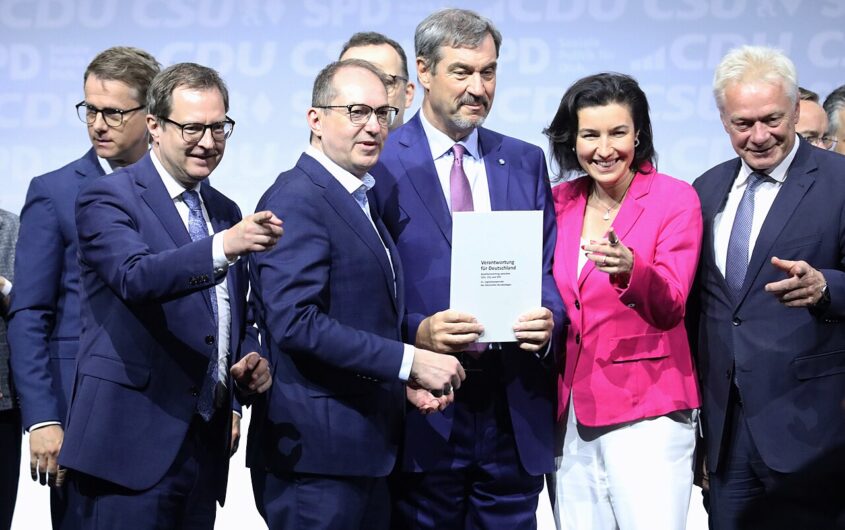
Martin Rulsch via Wikimedia Commons
AGI Profiles: Dorothee Bär

Zane Davis
Halle Foundation/AGI Intern
Zane Davis is a summer 2025 Halle Foundation Intern at the American-German Institute. His primary research interests include artificial intelligence policy, labor economics, and global trade.
Prior to joining AGI, Zane completed his bachelor's degree in economics from the University of North Carolina at Chapel Hill, where he also earned minors in German and philosophy. He developed an interest in artificial intelligence and global trade while working for a Munich-based software startup in 2022. In 2023, he relocated to Germany, where he played American football for the Ingolstadt Dukes of the German Football League. Since then, he has worked for organizations spanning the United States, Korea, and Thailand, strengthening his background in public policy and international affairs.
In the fall of 2025, he will return to Chapel Hill to begin the Master of Public Administration program at the UNC School of Government.
Federal Minister for Research, Technology, and Space
In May 2025, Dorothee Bär took office as Germany’s first Federal Minister for Research, Technology, and Space. As the former Parliamentary State Secretary to the Federal Minister of Transport and Digital Infrastructure from 2013 to 2018 and Minister of State for Digitalization at the Federal Chancellery from 2018 to 2021, Dorothee Bär has become a prominent national political figure, climbing the ranks of the Bavarian Christian Social Union (CSU) party on the way to a rebranded cabinet position in the new government. Over her political career spanning more than three decades, Bär has gained notoriety for her active social media presence, direct communication style, and ambitious, action-oriented philosophy. In the 2025 federal elections, Bär’s active approach proved an effective campaign strategy, as she won the highest percentage of first-place votes (50.5 percent) of any candidate in Germany. Now, she sits atop a €22.3 billion federal ministry with the power to shape the future of German research.
From Bavaria to Berlin
Dorothee Bär’s exposure to politics began early, as her father Werner Mantel was elected mayor of Ebelsbach, a small village in northern Bavaria. In her younger years, Bär claims she harbored ambitions of becoming a Catholic minister, but gender-based barriers within the Church steered her energies toward politics. Among her most formative experiences was a 1996 high school exchange year in the United States (Grayslake, Illinois), which she credits with shaping her into a “convinced transatlanticist” and instilling a keen awareness of Germany’s “historical responsibility.” Bär earned her degree in political science from Freie Universität Berlin in 2005, three years after entering the Bundestag.
She formally launched her political career in 1992 at age 14, joining the Junge Union (the youth wing of the CDU/CSU) and later the Christian Social Union. She quickly ascended, taking on various roles within the Junge Union on her way to becoming state chairwoman of the RCDS (a CDU/CSU student organization) and one of the youngest members of the CSU party executive in 2001 at just 23 years old.
Much of Bär’s political strength lies in her integration within the Bavarian CSU and the political capital she has built among the party’s elite. She has been a member of the German Bundestag since 2002 and has served as Vice Chairwoman of the CSU since 2017. Particularly significant is her long-standing political relationship with Alexander Dobrindt, a CSU heavyweight currently serving as Chancellor Friedrich Merz’s Interior Minister. The two entered the Bundestag together in 2002. From 2009 to 2013, Bär served as deputy general secretary of the CSU under Dobrindt as general secretary. Together, they led a successful campaign to institute a Frauenquote in the CSU, stipulating that 40 percent of state and district offices in the CSU should be filled by women. Bär subsequently served as the Parliamentary State Secretary in the Federal Ministry of Transport and Digital Infrastructure, again under Dobrindt, from 2013 to 2018. Bär and Dobrindt’s tenure in the transportation and digital infrastructure ministry made little progress on key issues, including their planned toll on foreign vehicles, improving the Deutsche Bahn, and reducing overall emissions, drawing criticism.
After the 2017 federal elections, Bär was selected as Germany’s first-ever Minister of State for Digitization. As a state minister, Bär was not afforded the resources or authority of a fully-fledged federal ministry, and her role was rather to be a mediator between Chancellor Merkel and her cabinet and to coordinate digital policy between the ministries. Becoming the face of the infamously underwhelming German digitization effort with little authority to implement any major changes, from 2018 to 2021, Bär became the prime target for frustration and criticism surrounding Germany’s low-tech schools, poor broadband coverage, and fealty to fax machines.
In interviews, Bär has explicitly thanked former Bavarian Minister-President Edmund Stoiber (CSU) and former federal economic minister Michael Glos (CSU) for her inclusion on the “state list” that enabled her initial 2002 entry into the Bundestag. Bär has also cultivated enduring political relationships with Bavaria’s CSU Minister-President Markus Söder (who has praised her negotiation skills) and current President of the Bundestag, Julia Klöckner (CDU). She is married to Oliver Bär (CSU), the District Administrator (Landrat) of the District of Hof. Through her thirty-plus years in CSU party politics, Bär has built a robust network of support and influence that enabled her to play a key role in the CSU’s coalition negotiation team following the 2025 election and paid off with her appointment to Merz’s cabinet.
Formerly known as the Federal Ministry for Research and Education (BMFB), the newly rebranded Bundesministerium für Forschung, Technologie und Raumfahrt came complete with the catchy “BMFuTuR” moniker, signaling a shift toward emerging technologies and space as major national priorities under Germany’s new governing coalition. For Bär, the appointment as Federal Minister for the BMFTR signifies a continuation of her future-focused political trajectory. Her commitment to digital issues was evident early on, taking leadership roles in the CSU-Netzrat (network council) in 2010 and CSUnet (a working group dedicated to internet policy) in 2011. She even organized a gaming party with members of the Free Democrats (FDP) in the Reichstag building in February 2011 in an attempt to engage parliament with gaming and technology-related subjects.
In the past, Bär’s efforts to articulate her ambitious vision for the future have occasionally backfired, leading to public failures such as her much-discussed advocacy for Flugtaxis (flying taxis) during her tenure as Chancellor Merkel’s Minister of State of Digitization. Bär’s subsequent failure to deliver flying taxis as state minister provided plenty of fodder for critics questioning her competence and qualifications. During an October 2017 episode of the German talk show maischberger, for example, Bär claimed that humans were not entirely at fault for climate change, prompting stark criticism from environmental activists. Such examples have fueled a mixed public image and skepticism from the research community regarding her non-scientific background.
On social media, Bär cultivates a conspicuous public profile. She posts often across a wide range of platforms including Instagram, TikTok, and X (formerly Twitter), where she has nearly 100,000 followers. Throughout her career, Bär has received significant online criticism from users on various platforms, aimed not only at her political positions and performance in office, but also at her appearance, outfits, and even the artistic merits of her Instagram feed. In the past, she has responded to the criticism with indifference, since in politics, “the main thing is that people are talking about you. Of the 680 members of parliament, there are many that no one even knows.” Bär has also emphasized her belief that the internet is “neither good nor evil,” and that there is a need for effective oversight across platforms. This desire for a more hospitable online ecosystem has also prompted Bär to call for the creation of a digital TÜV (technical surveillance union) to combat online hate speech and cyberbullying.
High-Tech Ambitions
As Federal Minister for Research, Technology, and Space thus far, Bär’s catchphrase “wir sollten viel öfter einfach mal machen” (we should just do things more often), has defined her rapid rollout of policy initiatives. The new research minister has already outlined a set of ambitious goals for the legislative period. Central to this is a comprehensive “high-tech agenda” designed to bolster Germany’s competitiveness in critical fields such as artificial intelligence, quantum computing, biotechnology, fusion energy, microelectronics, climate-neutral mobility, and even the gaming industry. Space strategy is a top priority by the new governing coalition, and Bär has been tasked with managing increased German engagement with the European Space Agency (ESA), contributing to greater European independence in space, and even putting a German astronaut on the moon.
Bär’s office has also rolled out legislative reforms intended to create a more agile and efficient research environment, including a Forschungsdatengesetz (Research Data Act) to improve data access for researchers and reforms to the Wissenschaftszeitvertragsgesetz (Academic Fixed-Term Contract Act) to eliminate barriers to employment for young researchers. For outside observers, much of Bär’s success (fairly or unfairly) will be judged by the performance of projects supported by the Federal Agency for Breakthrough Technologies (SPRIN-D), which funds research and development for potentially groundbreaking innovations like sustainable concrete and nuclear fusion, as these projects are often the most visible signs of technological progress in the private sector and for those outside the scientific community.
Underpinning these policies is Bär’s consistent rhetorical emphasis on the practical application of research. Slogans like “From Lab to Life” and the Initiative Forschung und Anwendung (Initiative for Research and Application) encapsulate her drive to translate scientific breakthroughs into tangible benefits for society and the economy. In her speeches to parliament and in public, she has made a concerted effort to link technological progress to the “ländlicher Raum,” ensuring that advancements are framed as beneficial to rural areas and that the discoveries made in space are brought back and applied practically on Earth.
On the international stage, Bär actively seeks to promote Germany as a research hub. In particular, Bär’s BMFTR has proposed the 1000-Köpfe-Plus-Programm, which aims to attract top international researchers in a direct response to research funding cuts in the United States. Since taking office, Bär has positioned Germany as a new home for scholars and scientists, promising “guaranteed scientific freedom.”
To deliver on this ambitious agenda, the BMFTR will have to overcome significant resistance. While the former research ministry successfully weathered proposed budget cuts in 2024 and is now slated for a budget increase, the true test for Bär will be in effectively deploying BMFTR funding and overcoming Germany’s long-standing reputation for technological caution. From a political perspective, the skepticism surrounding her non-scientific background means Bär will also need to build trust among the scientists, researchers, and industry leaders she is now tasked with leading.
Over her three decades in German politics, Bär has proven to be a resilient and often polarizing figure, recognized primarily for her social media presence and tech-focused policy aims. Now, as the head of a newly rebranded and strategically essential ministry, she holds the keys to an ambitious high-tech and space agenda intended to bolster Germany’s global competitiveness after decades of disappointment. Minister Bär must now translate the vision articulated in the new coalition agreement into concrete projects that deliver on her promise to create tangible, positive impacts in the lives of German citizens.








